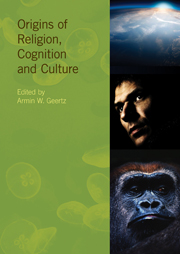Book contents
- Frontmatter
- Contents
- Contributors
- Introduction
- Part I EVOLUTIONARY SCENARIOS
- Part II COGNITIVE THEORIES
- 11 Cognition and meaning
- 12 Wittgenstein and the naturalness of religious belief
- 13 “Peekaboo!” and object permanence: on the play of concealment and appearance in cognition and religion
- 14 Yogācāra Buddhist views on the causal relation between language, cognition and the evolution of worlds
- 15 A resource model of religious cognition: motivation as a primary determinant for the complexity of supernatural agency representations
- 16 The recognition of religion: archaeological diagnosis and implicit theorizing
- 17 Religion and the extra-somatics of conceptual thought
- 18 Tools for thought: the ritual use of ordinary tools
- 19 Care of the soul: empathy in dualistic worldview
- 20 From corpse to concept: a cognitive theory on the ritualized treatment of dead bodies
- 21 Anthropomorphism in god concepts: the role of narrative
- Index
15 - A resource model of religious cognition: motivation as a primary determinant for the complexity of supernatural agency representations
from Part II - COGNITIVE THEORIES
- Frontmatter
- Contents
- Contributors
- Introduction
- Part I EVOLUTIONARY SCENARIOS
- Part II COGNITIVE THEORIES
- 11 Cognition and meaning
- 12 Wittgenstein and the naturalness of religious belief
- 13 “Peekaboo!” and object permanence: on the play of concealment and appearance in cognition and religion
- 14 Yogācāra Buddhist views on the causal relation between language, cognition and the evolution of worlds
- 15 A resource model of religious cognition: motivation as a primary determinant for the complexity of supernatural agency representations
- 16 The recognition of religion: archaeological diagnosis and implicit theorizing
- 17 Religion and the extra-somatics of conceptual thought
- 18 Tools for thought: the ritual use of ordinary tools
- 19 Care of the soul: empathy in dualistic worldview
- 20 From corpse to concept: a cognitive theory on the ritualized treatment of dead bodies
- 21 Anthropomorphism in god concepts: the role of narrative
- Index
Summary
In this chapter I present a resource model of religious cognition in which the complexity of agency and action representations in rituals is determined by situation-specific levels of motivation in the individual. The model represents an alternative to some of the central ideas in Lawson and McCauley's Ritual Form Hypothesis (Lawson & McCauley 2002), and in Whitehouse's Dual Modes Theory (Whitehouse 2002). Briefly, I argue that the amount of social cognitive processing invested in representations of religious concepts depends on the individual's level of motivation. In low-motivation rituals, people invest few cognitive resources in processing the beliefs and desires of superhuman agents. Only in situations where people feel that the beliefs and desires of such agents are strategically important, do they form complex theory of mind (ToM) representations. Social cognition comprises a range of activities from very minimal embodied and automatic processes, to more affective empathic processing, to elaborate meta-representations of other people's beliefs and intentions. Whereas the simplest and least resource-demanding processes are active in all social interactions, more elaborate social cognitive representations are only produced in interactions that require a high level of representational complexity.
In my model, simple embodied processes, empathic processing, and complex ToM representations are all products of the same functional system but at various levels of motivation. Whereas simple and automatic embodied reactions are constantly at work during social interactions, empathic processing intensifies with the perceived importance of an object, person or event, and only in attention-demanding situations do humans form elaborate meta-representations of others.
- Type
- Chapter
- Information
- Origins of Religion, Cognition and Culture , pp. 301 - 309Publisher: Acumen PublishingPrint publication year: 2013



